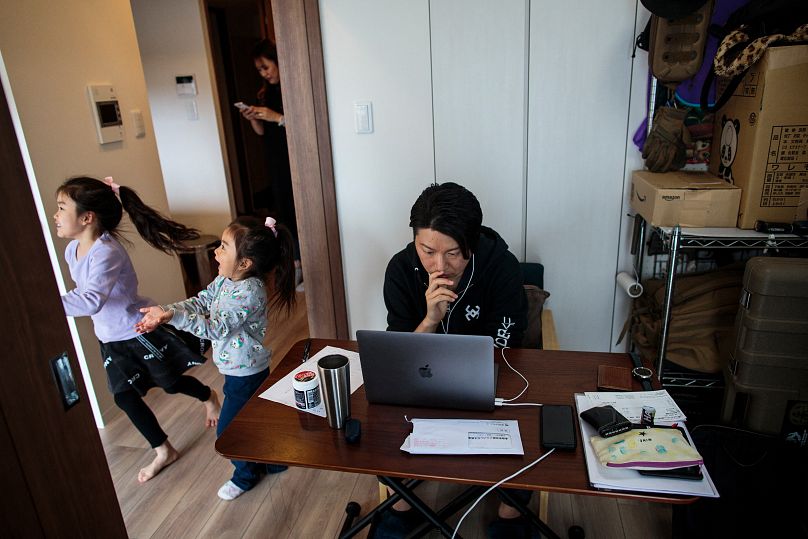People who work from home enjoy significant time savings by not commuting. However, much of the saved time flows back to employers. Only a third goes to leisure.
Tens of millions of workers across Europe found themselves working remotely from home during the COVID-19 pandemic in 2020 and 2021.
It's a habit that many enjoyed, and have continued - especially as employers see the benefits of flexible working arrangements.
However, a new study that looked at remote working habits in different countries finds that commuters save 72 minutes each day, on average, working from home.
However, they give a lot of that "saved time" back to their employers, according to research from the National Bureau of Economic Research (NBER).
Much of the saved time flows back to employers
On average, those who worked from home during the pandemic devoted 40 per cent of their time savings to primary and secondary jobs; 34 per cent to leisure (24 minutes); and 11 per cent to caregiving activities (8 minutes).
"These results suggest that much of the time savings flow back to employers, and that children and other caregiving recipients also benefit," the NBER concluded.
The European average is lower than the global average
The time saved by not commuting varied from 51 minutes in Serbia to 102 minutes in China. While the cross-country average in the sample is 72 minutes, it is 65 minutes for the 15 European countries considered in the research.
This might generally reflect shorter commutes in some European countries compared to other parts of the world.
The Netherlands had the most time saved in Europe with 77 minutes. Another recent study found that the Netherlands is the EU country with the highest proportion of workers working remotely.
Time saved by not commuting was 73 minutes in the UK; followed by 65 minutes in Germany; 63 minutes in Spain, and 62 minutes in France.
Using the time savings: 40% of time saved went to extra work
How do workers allocate these time savings? On average, researchers found that 40 per cent goes to extra work on primary and secondary jobs.
This ratio ranges 31 per cent in Germany, to 53 per cent in Taiwan, Singapore, and Malaysia.
The European average is 37 per cent, which is below the sample.
Workers in France devoted almost half of their saved time to their jobs
In France, workers allocated 44 per cent of their time savings to their jobs. This included both primary and secondary jobs. After Russia (46 per cent), France had the highest rate in this category in Europe, followed by 40 per cent in the Netherlands and Hungary.
In the UK, people who worked from home devoted 38 per cent of their time savings to their jobs.
Increases in leisure time were highest in Germany and Austria
Participants said that they devoted 34 per cent of their time savings to leisure during the pandemic. What is leisure? It includes both indoor activities such as reading or watching TV and movies, and outdoor activities such as sports, walking or gardening.
This rate varied from 25 per cent in Malaysia to 46 per cent in Germany.
Germany is followed by Austria (45 per cent), Spain (41 per cent) and Sweden (40 per cent).
In the European countries included in the sample, France (26 per cent) had the lowest rate of time savings devoted to leisure.
The share of saved time devoted to caregiving activities, including childcare, home schooling or caring for other relatives, was relatively low.
Averaging 11 per cent, the time savings devoted to caregiving ranged from 6 per cent in Singapore to 17 per cent in Serbia.
There are no major differences between the averages of European countries and others in the sample.
If you have kids, though, you devote more time to caregiving
That said, having children played a significant role in the allocation of time saved by not commuting.
Living with children under the age of 14 had particularly large effects. Women with children devoted an extra 11.4 minutes of their time saved by not commuting to caregiving activities compared to those without children.
For men, this was 9.0 minutes.
Does gender play a role?
What about gender? As we’ve just seen, women with children devoted an average of 2.4 more minutes of gained time to caregiving than men did. The NBER study found that the differences between men and women in how they allocated their time savings were generally modest.
While men devoted more of their saved time to their jobs, the daily difference was only 2.4 minutes. Men also devoted about 2 more minutes of their saved time to leisure compared to women.
In another report, the same researchers found that about one-quarter of workers globally would quit or start looking for another job if they were told to return to the workplace five days a week.












